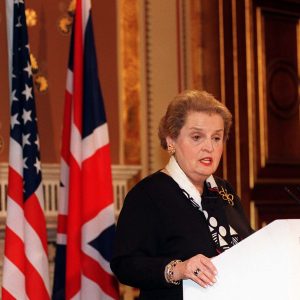25 Mar 2022 | Czech Republic, Opinion, Russia, Ruth's blog, Ukraine, United States
“We will not be intimidated or pushed off the world stage by people who do not like what we stand for, and that is, freedom, democracy and the fight against disease, poverty and terrorism.” — Madeleine Albright (1937-2022)
This week one of those special people passed away. A woman who broke glass ceilings, whose leadership inspired so many others, a woman who knew what she stood for and was determined to fight for what she knew to be right. She had a life well lived and has left her mark on the world. The reality is our society is lessened by her passing, but we were lucky to have her, and we so nearly didn’t.

Former US Secretary of State Madeleine Albright. Photo: Fiona Hanson/PA Images
Madeleine Albright was born Marie Jana Korbelová, in Prague in 1937, to a Jewish family. Her family fled to London in 1939 when the Nazis invaded. They converted to Roman Catholicism and hid their true identity for decades. The first female US Secretary of State only discovered the truth and the fact that 26 members of her family had been murdered in the Holocaust as an adult. At the end of the war her family chose to return to Czechoslovakia, but this proved short-lived and they were forced to flee the Communist regime in 1949 and seek asylum in the States.
As traumatic as her early life was, Marie Jana Korbelová did more than most to shape the future, to find hope and to cherish the democratic values that were stolen from her and her family. Her personal story and her impact were exceptional. But reflecting on her life has caused me to think a lot about the Children’s Memorial at Yad Vashem, Israel’s Holocaust Museum.
There is a single candle surrounded by mirrors. The reflection of each flame represents a life not born – a story not told. It highlights, in simply imagery, the lives that were extinguished, the families that were destroyed and, heartbreakingly, the children never born because their parents had been murdered. We have no idea of what the world lost because of the Shoah. The poetry and books not written, the art not created, the scientific discoveries not made.
Which brings me to the horrors we see every day on our news. The images of the death and destruction in Ukraine. Lives of every Ukrainian citizen have been turned upside down. We see daily reports of war crimes. Of children being killed, of journalists being kidnapped, of humanitarian aid being blocked.
In Ukraine today, the daily horrors shock and upset us all but for me it is also the devastation of the lives not lived. The talent that is being brutally removed from our world. Our collective society is being lessened because of their deaths and those that will now never be born. We will never know what we have lost. We can only hope that among those that survive there will be someone as inspirational as Madeleine Albright.
18 Mar 2022 | 50 years of Index, China, History, Ireland, Magazine, News, Philippines, United Kingdom, United States, Volume 51.01 Spring 2022 Extras
[vc_row][vc_column][vc_column_text]

The first issue of Index on Censorship magazine, in March 1972.
You may have heard that the 70s were different. In 1972, when the first issue of Index magazine was launched, no one knew that 20 years later there would be an influential economic bloc called the European Union. The Beatles’ had only just split. The World Trade Center in New York was being built, while Sir Edward Heath was the prime minister of the United Kingdom.
Fifty years on and some things remain. Queen Elizabeth’s reign goes on and celebrates its 70th anniversary in 2022. Dictatorships and censorship, which should be trapped in history books, continue to torment the lives of many. And as a result, Index on Censorship remains vigilant, defending freedom of expression and giving voice to those who are silenced.
As we celebrate our 50th anniversary, we go back in time and remember the remarkable events that happened in 1972.[/vc_column_text][vc_custom_heading text=”1″][vc_column_text]January 30th: British soldiers shoot 26 unarmed civilians during a protest in Derry, Northern Ireland. Fourteen people were killed on this day known as “Bloody Sunday”. [/vc_column_text][vc_custom_heading text=”2″][vc_column_text]February 1st: Paul McCartney and the Wings release “Give Ireland back to the Irish” in the UK. It would be banned by the BBC, nine days later. [/vc_column_text][vc_custom_heading text=”3″][vc_column_text]February 5th: Airlines in the United States begin to inspect passengers and baggage. Tough to imagine that people traveled without any surveillance. [/vc_column_text][vc_custom_heading text=”4″][vc_column_text]February 17th: British Parliament votes to join the European Common Market. In 2020, the United Kingdom would leave the European Union. [/vc_column_text][vc_custom_heading text=”5″][vc_column_text]February 21st: Richard Nixon becomes the first US president to visit China, seeking to establish positive relations in a meeting with Chinese leader Mao Zedong, in Beijing.

Mao Zedong and Richard Nixon during Nixon’s historical visit to China in 1972. Photo: Ian Dagnall/Alamy
[/vc_column_text][vc_custom_heading text=”6″][vc_column_text]March 15th: The Godfather, starring Marlon Brando and Al Pacino, premieres in New York. It wins Best Picture and Best Actor (Brando) at the 45th Academy Awards.

Al Pacino and Marlon Brando in the Godfather. The first film of one the most successful franchises of all time was released in 1972. Photo: All Star Library/Alamy
[/vc_column_text][vc_custom_heading text=”7″][vc_column_text]June 18th: British European Airways Trident crashes after takeoff from Heathrow to Brussels, killing all 118 people on board. [/vc_column_text][vc_custom_heading text=”8″][vc_column_text]July 1st: Feminist magazine Ms, founded by Gloria Steinem, publishes its first issue, with Wonder Woman on the cover.[/vc_column_text][vc_custom_heading text=”9″][vc_column_text]August 4th: Uganda dictator Idi Amin orders the expulsion of 50,000 Asians with British passports.
[/vc_column_text][vc_custom_heading text=”10″][vc_column_text]September 4th and 5th: 11 members of the Israeli Olympic team are murdered by a Palestinian terrorist group in the second week of the 1972 Olympics in Munich.[/vc_column_text][vc_custom_heading text=”11″][vc_column_text]September 21st: Philippines President Ferdinand Marcos declares martial law. In 2022, his son Ferdinand ‘Bongbong’ Marcos is running for president. [/vc_column_text][vc_custom_heading text=”12″][vc_column_text]October 13th: A flight from Uruguay to Chile crashes in the Andes Mountains. Passengers eat the flesh of the deceased to survive. Sixteen people are rescued two months later.[/vc_column_text][vc_custom_heading text=”13″][vc_column_text]November 30th: BBC bans “Hi, Hi, Hi”, by Paul McCartney and The Wings, due to its drug references and suggestive sexual content. [/vc_column_text][vc_custom_heading text=”14″][vc_column_text]December 7th: Apollo 17 is launched and the crew takes the famous “blue marble” photo of the entire Earth.

The earth seen from the Apollo 17 spacecraft. Photo: NASA/Alamy
[/vc_column_text][vc_custom_heading text=”15″][vc_column_text]December 28th: Kim Il-Sung takes over as president of North Korea. He’s the grandfather of the country’s current leader, Kim Jong-un. [/vc_column_text][vc_custom_heading text=”16″][vc_column_text]December 30th: US President Richard Nixon halts bombing of North Vietnam and announces peace talks in Paris, to be held in January 1973. [/vc_column_text][/vc_column][/vc_row]
25 Feb 2022 | Belarus, News, Russia, Statements, Ukraine
We, the undersigned organisations, stand in solidarity with the people of Ukraine, but particularly Ukrainian journalists who now find themselves at the frontlines of a large-scale European war.
We unequivocally condemn the violence and aggression that puts thousands of our colleagues all over Ukraine in grave danger.
We call on the international community to provide any possible assistance to those who are taking on the brave role of reporting from the war zone that is now Ukraine.
We condemn the physical violence, the cyberattacks, disinformation and all other weapons employed by the aggressor against the free and democratic Ukrainian press.
We also stand in solidarity with independent Russian media who continue to report the truth in unprecedented conditions.
Join the statement of support for Ukraine by signing it here.
#Журналісти_Важливі
Signed:
- Justice for Journalists Foundation
- Index on Censorship
- International Foundation for Protection of Freedom of Speech “Adil Soz”
- International Media Support (IMS)
- Yerevan Press Club
- Turkmen.news
- Free Press Unlimited
- Human Rights Center “Viasna”
- Albanian Helsinki Committee
- Media Rights Group, Azerbaijan
- European Centre for Press and Media Freedom
- Association of European Journalists
- School of Peacemaking and Media Technology in Central Asia
- Human Rights Center of Azerbaijan
- Reporters Without Borders, RSF
- Association of Independent Press of Moldova, API
- Public Association “Dignity”, Kazakhstan
- PEN International
- Human Rights House Foundation, Norway
- IFEX
- UNITED for Intercultural Action
- Human Rights House Yerevan
- Helsinki Citizens’ Assembly – Vanadzor, Armenia
- Rafto Foundation for Human Rights, Norway
- Society of Journalists, Warsaw
- The Swedish OSCE-network
- Hungarian Helsinki Committee
- Legal policy research centre, Kazakhstan
- Public Foundation Notabene – Tajikistan
- HR NGO “Citizens’ Watch – St. Petersburg, Russia
- English PEN
- Public organization “Dawn” – Tajikistan
- International Press Institute (IPI)
- The Union of Journalists of Kazakhstan
- ARTICLE 19
- Human Rights House Tbilisi
- Rights Georgia
- Election Monitoring and Democracy Studies Center, Azerbaijan
- International Service for Human Rights (ISHR)
- Bulgarian Helsinki Committee
- Global Forum for Media Development (GFMD)
- European Federation of Journalists
- Social Media Development Center, Georgia
- Independent Journalists’ Association of Serbia
- OBC Transeuropa
- The Bureau of Investigative Journalism
- Journalists Union YENI NESIL, Azerbaijan
- Media and Law Studies Association (MLSA) , Istanbul
- Baku Press Club
- Centre for Journalism Innovation and Development
- Union Sapari
- The Coalition For Women In Journalism (CFWIJ)
- Committee to Protect Freedom of Expression, Armenia
- FEDERATIA SINDICATELOR DIN SOCIETATEA ROMANA DE RADIODIFUZIUNE, Bucharest, ROMANIA
- CD FILMS (FRANCE)
- CFDT-Journalistes
- Belarusian Association of Journalists
- SafeJournalists network
- Association of Journalists of Kosovo
- Association of Journalists of Macedonia
- BH Journalists Association
- Croatian Journalists’ Association
- Independent Journalists Association of Serbia
- Trade Union of Media of Montenegro
- Analytical Center for Central Asia (ACCA)
- Trade Union of Croatian Journalists
- European Press Prize
- Ethical Journalism Network
- European Journalism Centre
- Slovene Association of Journalists
- Investigative Studios
- PEN Belarus
- Public Media Alliance (PMA)
- Estonian Association of Journalists
- Federación de Sindicatos de Periodistas (FeSP) (Spain)
- DJV, German Journalist Federation
- Free Russia Foundation
- Association for Human Rights in Central Asia – AHRCA
- “Human Rights Consulting Group” Public Foundation, Kazakhstan
- Committee to Protect Journalists
- Ski Club of International Journalists (SCIJ)
- Women In Journalism Institute, Canada – associate of CFWIJ
- Romanian Trade Union of Journalists MediaSind
- Romanian Federation Culture and Mass-Media FAIR, MediaSind
- New Generation of Human Rights Defenders Coalition, Kazakhstan
- Coalition for the Security and Protection of Human Rights Defenders, Activists, Kazakhstan
- Legal policy Research Centre, Kazakhstan
- Eurasian Digital Foundation, Kazakhstan
- Legal Analysis and Research Public Union, Azerbaijan
- German Journalists Union
- Digital Rights Expert Group, Kazakhstan
- Bella Fox, LRT/Bellarus Media, Lithuania
- Syndicat national des journalistes CGT (SNJ-CGT), France
- Karin Wenk, Editor in Chief Menschen Machen Medien
- Press Emblem Campaign
- Federacion de Servicios, Consumo y Movilidad (FeSMC) – UGT (Spain)
- Sindicato dos Jornalistas, Portugal
- International media project Август2020/August2020 (august2020.info), Belarus
- Independent Association of Georgian Journalists (journalist.ge)
- Independent Trade Union of Journalists and Media Workers, Macedonia
- Adam Hug, Director, Foreign Policy Centre
- Zlatko Herljević, Croatian journalist, lecturer of journalism at University VERN, Zagreb, Croatia
- Independent Journalists’ and Media Workers’ Union (JMWU), Russia
- The Daphne Caruana Galizia Foundation
- Hungarian Press Union (HPU), Hungary
- Lithuanian Journalists Union
- National Union of Journalists UK & Ireland
- Federazione Nazionale Stampa Italiana (Italy)
- Dutch Association of Journalists (NVJ)
- Uzbek Forum for Human Rights
- Association of Journalists, Turkey
- Slovak Syndicate of Journalist, Slovakia
- GAMAG Europe (European Chapter of the Global Alliance for Media and Gender)
- Slovenian Union of Journalists (SNS)
- Federación de Asociaciones de Periodistas de España (FAPE)
- Syndicate of Journalists of Czech Republic
- 360 Degrees, Media outlet, North Macedonia
- Frontline, Skopje, North Macedonia
- Community Media Solutions (UK)
- The Norwegian Union of Journalists, Norway
- Rentgen Media (Kyrgyz Republic)
- Union of Journalists in Finland (UJF)
- Syndicat National des Journalistes (SNJ), France
- The Swedish Union of Journalists, Sweden
- Asociación Nacional de Informadores de la Salud. ANIS. España
- Association Générale des Journalistes professionnels de Belgique (AGJPB/AVBB)
- Macedonian Institute for Media (MIM), North Macedonia
- Lithuanian Journalism Centre, Lithuania
- Club Internacional de Prensa (CIP), España
- Periodical and Electronic Press Union
- Fojo Media Institute, Sweden
- Mediacentar Sarajevo
- Media Diversity Institute
- Impressum – les journalistes suisses
- Agrupación de Periodistas FSC-CCOO
- South East European Network for Professionalization of Media (SEENPM)
- TGS, Turkey
- Investigative Journalism Center, Croatia
- Verband Albanischer Berufsjournalisten der Diaspora, Schweiz
- IlijašNet
- Journalists Union of Macedonia and Thrace (Greece)
- The Union of Journalists of Armenia (UJA)
- Associació de Periodistes Europeus de Catalunya (APEC)
- International Association of Public Media Researchers (IAPMR)
- FREELENS e.V. – German Association of Photojournalists & Photographers
- LawTransform (CMI-UiB Centre on Law & Social Transformation, Bergen, Norway)
- Bangladesh NGOs Network for Radio & Communication
- Platform for Independent Journalism (P24), Turkey
- Novi Sad School of Journalism (Serbia)
- Col·legi de Periodistes de Catalunya (Catalunya)





